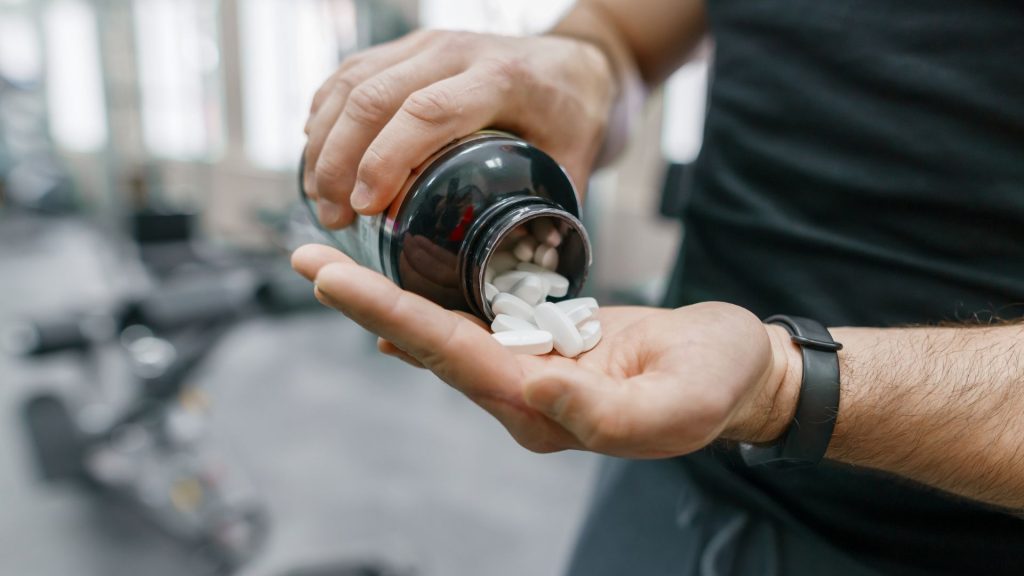Many athletes seek an edge on the field, court or mat. A healthy diet serves as the cornerstone for performance enhancement; however, supplementation such as creatine, beta-alanine and caffeine may play a small role in aiding athletic performance.
Athletes can take advantage of supplements containing magnesium and omega 3 to aid their muscle recovery after intensive training sessions.
1. Creatine
Creatine is a favorite among athletes as a supplement that increases strength, speeds up muscle recovery and enhances cognitive and endurance performance.
Creatine, found naturally in meat and fish, serves as a precursor for the energy currency used by muscle cells – Adenosine Triphosphate or ATP. When your body runs out of ATP during high intensity exercises, fatigue sets in. Creatine replenishes it during higher-intensity workouts to prevent fatigue.
Studies demonstrate that creatine can significantly decrease exercise-induced muscle damage and enhance performance during repeated sprint exercises, as well as decreasing risk of injury by improving balance between anti-inflammatory and pro-inflammatory responses. Creatine may even aid those living with amyotrophic lateral sclerosis (ALS), possibly by slowing disease progression; more research needs to be conducted. It might also assist people who have metabolic disorders impairing creatine metabolism such as GAMT deficiency or AGAT deficiency.
2. Caffeine
Caffeine is both a drug and nutrient, present in coffee, nutritional supplements, tea, soft drinks and energy drinks. Caffeine helps enhance mental alertness as well as athletic performance by delaying fatigue during physical exertion while increasing strength, muscle endurance and power.
Caffeine has been shown to aid endurance exercisers of virtually all kinds, according to Glaister. While its exact effects on performance remain elusive, some hypothesize that caffeine increases neural transmission frequency or size and decreases pain signals from the brain thereby improving performance.
Studies have also demonstrated the ability of caffeine to improve performance under extreme environmental conditions such as heat and altitude. However, additional research into its acute effects on recovery from exercise-induced muscle damage (EIMD) remains necessary.
3. Protein Powders
Protein is a key macronutrient for supporting muscle development and hormone and enzyme production. Furthermore, protein helps manage cholesterol, blood pressure and blood sugar levels effectively.
Although bodybuilders and athletes often require extra protein supplementation, most individuals already get sufficient from eating whole foods, particularly when following a plant-based diet. Protein powders may contain unhealthy levels of sugar or heavy metal contaminants.
To avoid such issues, look for products with third-party testing such as NSF International’s Certified for Sports program and made with natural ingredients like water and tart cherry juice – something like Orgain’s NSF vegan protein powder which also doesn’t contain artificial flavors and colors, caffeine or unknown herbs.
4. Electrolytes
Electrolytes such as sodium are essential minerals that regulate fluid balance, muscle contractions and nerve function. Although commonly found in sports drinks that promise to replace electrolytes lost from intense sweating, their best sources include dairy products like milk or coconut water and unsweetened beverages like unsweetened beverages.
Though supplements do have their benefits, taking too many can be harmful if taken excessively. Furthermore, many are unregulated and could contain banned substances like protein powder contaminated with stimulant ephedra. Therefore it’s crucial that when selecting new supplements it be discussed with your physician first and only then begin any regimens on your own.
5. Omega-3s
Researchers continually discover more information regarding the health benefits of omega-3 fatty acids. A nutrient found in foods like oils, nuts, seeds and fatty fish, this type of fat has been linked with reduced heart disease risk by improving triglyceride levels, lowering LDL cholesterol levels and supporting healthy arterial function and blood pressure regulation.
EPA and DHA are two omega-3 fatty acids often found in fish, and supplementing your diet with them may help athletes who participate in resistance or team-based exercises improve strength, endurance, and recovery. Krill oil is another great source of omega-3s; either purchased as a supplement or added directly into meals; before taking this or any other dietary supplements it’s wise to consult your physician first.


